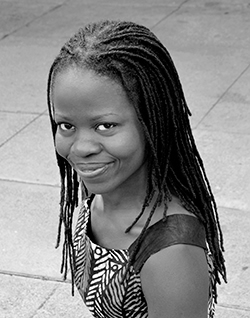|
Everything is made beautiful in its time. Moving through the seasons of the writer's life has become for me, gradual acceptance that the uncertainty of the creative path is maybe the most hopeful reason to continue on, even when the waters are slow. I'm learning that to remain writing, again and again, I must yield—even when it's overwhelmingly hard—to the mystery of how words come together on a page, and the even more enigmatic convergence of the life experiences in which these words are afloat. I have yet to outline a story from beginning to end. I say it's because I don't know how; I know it is because I just have to work my way through the layers. I don't know what I'm writing, until I've tried to write it.
About five years ago, without a backup plan and with an embarrassingly low cash fund, I left a probably lucrative career as a lawyer, and plunged into a fiction writing world of which I knew very little, except the small collection of works I'd admired over the years. Having just moved from New Orleans, and witnessed with the rest of the world, the horror of Katrina and its aftermath, I clicked open a blank page and tried to imagine how the hours between night and dawn, inside the Louisiana Superdome, might have been for someone who hadn't the sort of choices that allowed me to leave the city in the first place. When the resulting short story was accepted for publication some time later, I decided—subconsciously, I'm sure—that going forward, I would try to write of things that hold meaning for me.
I admit, with much less self-consciousness now, that I'm a writer who obsessively seeks meaning in the things happening in and outside me. If not for trying to use words to name the unnamable, I'd find little reason to continue this work. And in the end, though the words stand alone on the page, the process of getting them there cannot be separated from everything else happening off that page; the instant we write is the coming together of everything.
That something is made beautiful in its time means that it doesn't always begin that way. Two and a half years ago, after reading on an angst-ridden online writers' forum that the MFA in Creative Writing was the most legitimate path for a serious fiction writer, I doubted whether I could thrive without this academic backing. Absorbing this fear into my own longing for community, I applied to five schools, and with thousands others, nervously awaited my career fate. In the wake of being thoroughly rejected from each program, and again, with no alternative plan and even less cash than before, I sold all of my things in Florida, and bought a one-way ticket to San Francisco, without work or housing awaiting me. Within two weeks of my arrival, I found paid work and a shared space, and eventually, more ups, downs, and in-betweens than I'd ever thought probable in a one-year period. And still, in this new and unique place that I now call home, and which has become home, because those other potential homes had said no, I am becoming less shaken by the things that don't come. In their absence, I've learned to ride the ebb of the present season, into the flow of the one ahead.
There is a time, a season for each thing: a time to act, and a time to wait. When I forget this, I struggle to make progress with work that requires not force, but patient, gradual persistence. In this waiting season, it is as if nothing at all is happening, and it can feel as if the things that are, discourage us from continuing on. The bane of most writers' lives, this waiting time asks that we be alone with the very things we are waiting—wading—through: doubt, stagnation, aching self-consciousness. In solitude, we are to hold vigil over our words. We turn them over on all their sides, and then tuck them away; we take them out again, and put them on the page, even when they seem unworthy of it. We trust that in their time, they will tell a whole story, beginning to end. And because it is only a season, the waiting eventually gives way to the birthing of a piece that had been incubating all along, somewhere away from our eyes. I'm learning that more important than the layout of the work before me, is the willingness to see it through, s-l-o-w-l-y, come hell or high water—and both will come; but only for a time.
And still, we must accept that sometimes, this thing of beauty is not touchable, or measurable, even. It may not be publication or any sort of acknowledgment for a work; but sometimes it's both, and that's a joy. More often though, the beauty is the peace that comes when we see the past in the light of where we are now. The things that have come and gone, and even the ones that never arrived, suddenly join with meaning, and just like that, we understand that time has done its good work. And then: on to the next season.
|


